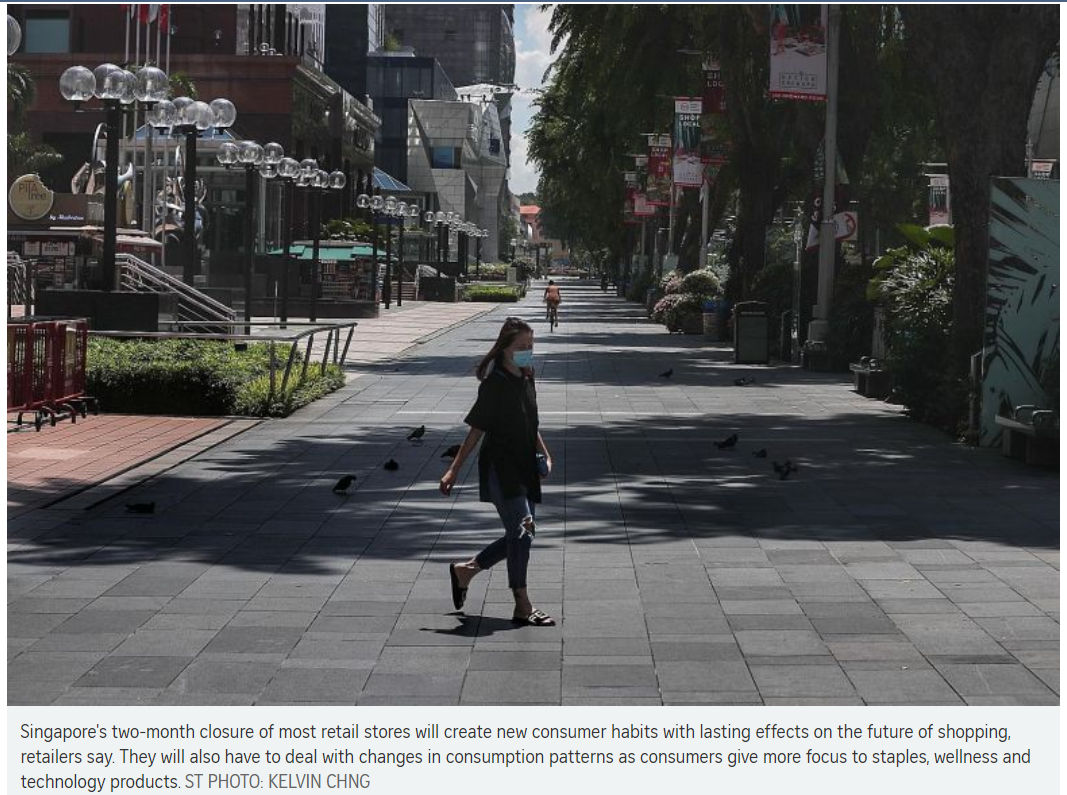Coronavirus: Singapore retailers must adapt to new shopping habits
A month into Singapore’s circuit breaker, which has led to most stores being shut, retailers have two options: adapt or die.
When the dust finally settles, the retail landscape is likely to be less vibrant as smaller players disappear, and those that survive will have to respond to new shopping habits, industry observers say.
While industry giants are toppling overseas, major chains in Singapore have said that they are not yet in dire straits.
Wage subsidies and training incentives have prevented mass layoffs, though some outlets face closure if landlords do not provide adequate rental relief, they added.
E-commerce sales have exploded in recent weeks, but are not nearly enough to cover the loss of in-store sales.
Mr Pang Fu Wei, managing director of baby product retailer Mothercare, said that while online sales have risen by more than four times compared with last year, its overall revenue has dropped by 70 per cent since the circuit-breaker measures began.
Last month, the firm introduced a digital nursery adviser service, keeping one of its more successful in-store initiatives alive.
The service allows customers to call for a consultation and receive product recommendations customised to their needs. The average basket size for these orders is more than three times that of a regular online order, said Mr Pang.
The store has also partnered e-commerce marketplace LazMall to expand its reach.
Sales staff from the chain’s 11 stores have been redeployed to help fulfil online orders and improve product descriptions on the e-commerce sites.
“There was this joke going around about who has spurred digital innovation in your organisation: the CEO, CTO or Covid-19,” said Mr Pang.
-
Global brands in trouble
- A number of major global retailers are struggling amid the Covid-19 pandemic, closing down stores, including in Singapore.• Hong Kong-listed Esprit announced last week that it will shut all 56 stores in Asia outside mainland China, including 12 in Singapore.
• British fashion chains Oasis and Warehouse will close all their outlets for good, after administrators failed last month to find a buyer for them.
• Homeware and apparel retailer Cath Kidston announced last month that all 60 of its shops in Britain will be shut as part of a deal that will keep its online and franchise operations running. The retailer has four outlets in Singapore.
• California-based jeans maker True Religion Apparel filed for bankruptcy protection on April 13, saying that the prolonged closure of stores across the United States had worsened existing liquidity constraints.
• American clothing brand J.Crew filed for bankruptcy protection yesterday, but is expected to stay in business after undergoing restructuring. It shut its two Hong Kong stores in February.
Tiffany Fumiko Tay
Department store BHG, which has not earned any revenue since the circuit breaker began, will be launching its e-commerce store this month.
Chief financial officer Jheeva Subramanian said plans were already in the works, but the current situation had made the move a bigger priority.
The firm last year embarked on a strategy to jazz up the department store, something that Mr Jheeva said was overdue.
Adding more lifestyle offerings as well as creating private labels through collaborations with local designers are among the ways BHG hopes to revitalise the brand and draw younger crowds.
“Challenges like the current Covid-19 situation are also an opportunity for innovation and change,” said Mr Jheeva .
Furniture retailer Scanteak, which enjoyed a spike in demand for tables, chairs and shelves at the start of the circuit breaker as more people began working from home, said the rapid growth in online sales has been a “bright spark that gives us a direction to focus on”.
However, Ms Jamie Lim, Scanteak’s chief executive, said she is considering closing one of the 12 stores in Singapore when its lease ends as part of a move to prepare for the future.
The firm is retraining employees and researching new furniture products in the meantime.
Benjamin Barker’s chief operating officer Damien Tan said it may also consolidate its 11 stores if rental support is not extended beyond next month.
“Post-Covid-19, it will not be business as usual,” he said, adding that the situation required businesses to rethink the way they worked.
The two-month closure of most retail stores will create new consumer habits which may have lasting effects on the future of shopping, retailers said.
Mrs Helen Khoo, executive director of Wing Tai Retail which has more than 90 stores in Singapore under brands such as adidas and Topshop, believes a year of slow recovery lies ahead.
In addition to pressures of business operational sustainability, retailers will also have to deal with changes in consumption patterns as consumers give more focus to staples, wellness and technology products, she said.
“Retailers with deep pockets might be able to ride this out, but smart retailers are looking hard at facts and starting to adapt their strategies,” said Mrs Khoo.
Mothercare’s Mr Pang said that as Singaporeans become accustomed to buying nearly all of their needs online during this period, it would likely become part of their nature when stores reopen.
“People will still go to malls, but I think retailers now really have to think about in-store experience. This might be the final nail in the coffin for boring retail,” he said.
Source: https://www.straitstimes.com/singapore/spore-retailers-must-adapt-to-new-shopping-habits


 Thailand
Thailand




